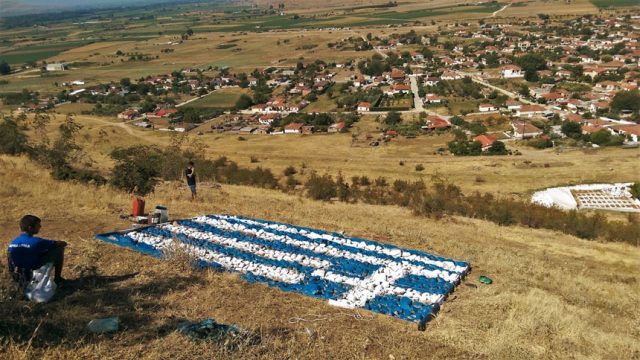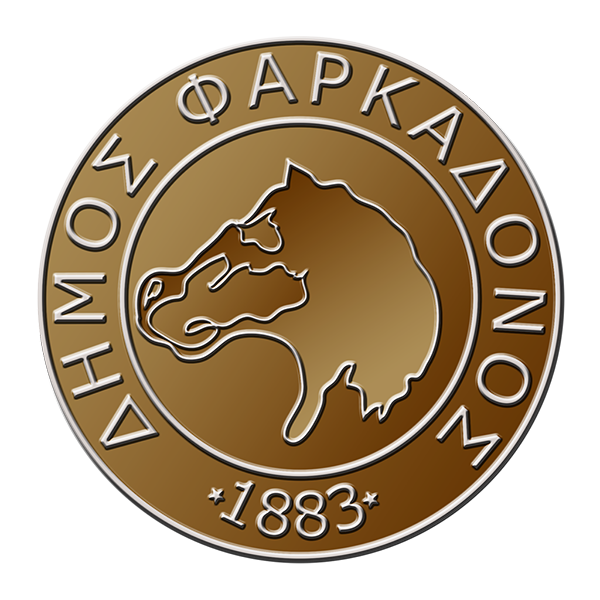Undoubtedly, all the residents of Zarkos and probably the residents of the wider area of Farkadona Municipality, know Koutra, one of the four mountains that surround Zarkos (the other three are Kokkinadaki, Dubrousi and Akamatis). However, how many know about the battle of Koutras, one of the most humiliating pages of our recent history, which only those who are serious about history know about, since the official military history prefers to keep it quiet?
Looking at the low rocky slopes that surround Zarko from the northeast, one does not pay much attention. But if he studies the recent and distant past, if he walks to the ruins of the old outposts of the Greek-Turkish border and from there to the top to look down on the villages of the Thessalian plain, he will certainly not regret it.
In the northwest of Zarkos is the Holy Monastery of Ag. John the Theologian, which has been linked to the struggles of the residents during the revolution against the Turks. Confirmation of the strategic position of the area is the building to the north of the monastery, a kind of customs house since until 1912 the Greek-Turkish border reached there (I remember my grandparents talking about Turkish and Greek, respectively meaning Turkey and Greece).

Starting from the monastery, one can attempt to climb to the top of Koutra (altitude 734 m). Here, as mentioned above, one of the most shameful moments in the modern history of Greece unfolded, a consequence of the political division between Charilaos Trikoupis and Theodoros Diligiannis.
But let’s come to the episode of Koutras and the events that preceded the battle of Koutras. We are in September 1885. In Athens we have demonstrations every day. Thousands of people gather in front of the palace and the house of Prime Minister Diligiannis demanding that he declare war on Turkey. They constantly shouted “Long live the war, that’s why they went down in history as “petty wars”. To escape the pressure, Diligiannis declared conscription.
But he could neither wage war, because he would lose him, nor could he revoke conscription, because he would be ridiculed. He thought that, with the threat of war, he could get some trade-offs. The opposition characterized his stance as “armed begging” and “peace war”. Finally, the solution was provided by the “Great Powers”, who demanded that Greece stop lionizing, imposing a naval blockade on it. Diligiannis seized the opportunity and resigned “heroically”. In his place, the Parliament elected Trikoupis as prime minister. In April 1886, sections of the Greek army at the instigation of the junior and more irritable nationalist officers who were unhappy with the dishonorable solution of the naval blockade, but also with the reforms in the army that were unfavorable to them that would follow with the change of government, denounced Trikoupis as “a man of the English” and attempted to hasten the attack on Turkey by invading Turkish territory (behind the Kutra mountain) to create a fait accompli before the new government.
So on the night of May 9, 1886, while Trikoupis was forming a government, they invaded the Ottoman lands of Thessaly. The episode caused excitement in Athens. Everything that followed, however, was anything but happy for the enthusiastic devotees of – even if on a small scale – Greco-Turkish war. The fighting lasted for five days and although the Greeks scored notable successes, the Turks managed to capture 280 men in Koutra from the 5th Euzonian battalion under the command of Major Constantinos Lori, which, after being abandoned by the rest of the corps, surrendered to the Turks.
Loris was mortally wounded defending Koutra of Zarkos after a seven-hour battle on May 11, 1886, and expired a few days later. The Turks then dishonorably transported them to Macedonia in order to intimidate its Greek inhabitants. On May 12, 1886, an armistice was signed and on May 24, Diligiannis’ “peace war” officially ended, leaving our country without allies in the Balkans and without a combative military force.
This act deeply hurt the national pride of the Greeks and provoked strong reactions. It is not so important to refer to them as to the process of lifting the blockade that followed the events of Koutras and especially to the handling by the Great Powers. The newspapers of the time protest because the European Powers followed Germany in the Greek question and express their bitterness and complaint at the humiliating terms they imposed on Greece. In fact, a front-page cartoon of the newspaper “Asti” depicts Bismarck in Turkish uniform fighting against the Greeks during the border skirmish in Koutra, while opposite him the euzone illuminates with the lantern the figure of the German Secretary General.
The caption reads: “The recognition of the iron chief secretary at the border”.
In the same spirit, Souri’s “Romeus”, once again enlisting all the stereotypes that want Europe to be indifferent to the rights of Greece, attacks the Western Powers for their unfair behavior towards Greece:
“And you, Europe, laugh at us and are always the same.
And I wonder, but the cross, how until this hour
but you didn’t send us battleships here (…)
So what else do you demand from us, Europe?
and are you still holding us by the throat?”
Souri’s attack is centered against Germany, which
considers responsible for all the bad things that happened in Greece:
“You, Chancellor of the Sachlo-Germans
you move both earth and heaven against us (…)
you, most noble of the West, thug,
you are playing a dirty and dirty game again
and Mr. Gladstonos is having a hard time…”
An opportunity to remember some more verses of Souri’s “Rome”, in which he refers to Zarko’s Koutra, paraphrasing Solomos:
“In Koutras, the stone ridge
Greece walking alone
it commemorates the glory of the years
and wreaths around he scatters
and in Koutras there are the stones
she beats her broken leg.”
The protagonist? of the battle of Koutras, Konstantinos Loris, Greek soldier, who took part in the liberation struggles from 1866 to 1886, was born in 1837 in Promyrio, Magnesia. He took part in the Cretan Revolution (1866-1869) and in the revolution in Thessaly in 1878, where he excelled. The battle of Koutras also marked the end of his military career with his death, which plunged the village of Zarko into mourning. The women of Zarkos, in the superintendence building, where the dead colonel of the 5th Evzones Regiment was buried, sang the following obituary:
You draw cool air and you cool me down
To cool off the kids, Luris the lads.
Who fight fiercely, high on the black Coutra,
No bread, no water, no money.
– My children, do not be afraid, do not put it in your mind,
As long as Louris is alive, do not worship.
He didn’t save the speech and he didn’t get lucky
His mouth was filled with blood, his lips with medicine
And his tongue sings like a swallow.
There is also another variation of the folk song above:
You draw cool air and you cool me down
To cool the children, Lori’s lavender.
Who fight fiercely, high in the black Koutra.
Five merulas fasting and ten thirsty.
And Loris interpreted them and Loris recites them
“As long as Loris is alive, by all means do not worship.”

